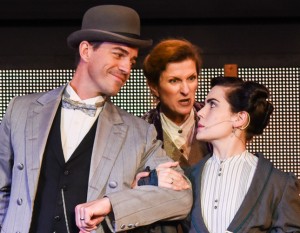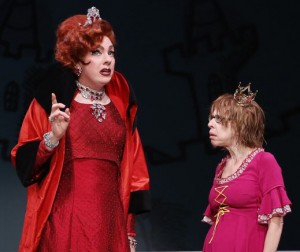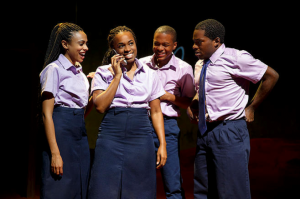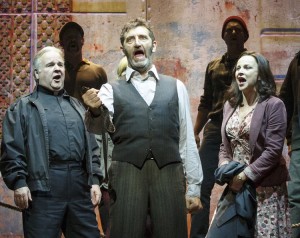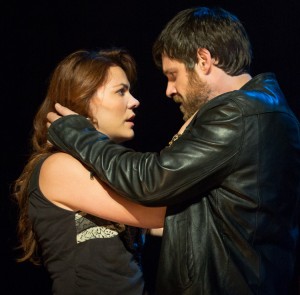Waiting in the Wings is the sort of show that materializes every June with a gay-themed subject to celebrate Pride Month intentionally or obliquely. This adaptation of a 2014 movie, in which Sally Struthers, Christopher Atkins and Shirley Jones appeared, stars Jeffrey A. Johns, who wrote the screenplay and reprises his writing and acting roles for the stage.
Clueless, the Musical
Unlike, say, a film such as Oliver Stone’s Wall Street, Clueless has the rare good fortune of clearly representing its historical moment without coming off as a creaky relic. Writer/director Amy Heckerling set her 1995 film in a sort of alternate reality, where the fabulously rich teens of Beverly Hills (already its own parallel universe) reference Kenny G and Christian Slater while dropping hyper-intelligent aperçus disguised as Valley Girl slang. Light on its feet and funny as hell, Clueless was in the ’90s but not of the ’90s.
Heist!
Heist! is a funny, upbeat new showcase for highly talented musical theater artists. Directed by James Will McBride, the show concerns three bank robbers —Gil (Cordara Newson), Jack (Alec Irion) and Chris (James Cella)—and a job gone bad. Their robbery fails, and only Gil and Jack escape. Jack spirals downward at the news that Chris was killed by the police.
Lonesome Blues
“Lonesome Blues,” a new musical at the York, is a historical dramatization of the life of Blind Lemon Jefferson through music. Jefferson was an itinerant Texas bluesman who was one of the first to be recorded by Paramount Records in the 1920s. He is said to have influenced everyone from Leadbelly to Bob Dylan to the Beatles. Jefferson went on to record 80 songs until his untimely death in his early 30s. He was found frozen near the river in Chicago. The blues, as does the play, tells the story of this rough life for African-Americans in America in the early 20th century. “Blues hits a nerve and that hurts” Jefferson declares.
Loveless Texas
Inspired by Shakespeare’s Love’s Labor’s Lost, Boomerang Theatre Company’s Loveless Texas is a toe-tapping musical comedy set during the early years of the Great Depression. Although many of the characters hold the same names as in the Shakespeare play, the story begins with a twist: Berowne Loveless Navarre (the hugely talented Joe Joseph) and his buddies—Duke Dumaine (Colin Barkell) and Bubba Longaville (Brett Benowitz)—are playboys who travel from New York to Paris. Along the way they do all the things that upstanding young men shouldn’t be doing: chase women, drink liquor and spend the Navarre family money.
Lili Marlene
The musical Lili Marlene takes its name from the famous German love song of World War II, first recorded in 1939. It became a hit among German troops (in spite of Joseph Goebbels’s dislike of it) and was eventually popularized among Allied troops as well, in a famous rendition by Marlene Dietrich in 1944. Yet that’s only an imaginative jumping-off point for the show of the title, which takes place between June 1932 and June 1933, at the tail end of the Weimar Republic and the first days with Adolf Hitler in power.
Sweet Charity
The musical Sweet Charity has good bloodlines—book by Neil Simon, music by Cy Coleman, lyrics by Dorothy Fields, original direction and choreography by Bob Fosse—yet the 1966 show has never occupied the top tier of musicals, such as My Fair Lady, South Pacific, Fiddler on the Roof or Gypsy. It has hardly languished in obscurity—there was a decent Broadway revival in 2005—but the New Group production directed by Leigh Silverman is such a persuasive delight that you may come away thinking it is top-tier after all. The production benefits from a terrific performance by Sutton Foster, a two-time Tony winner (and star of TV Land channel’s popular series Younger) in the title role. Foster is better known for big-budget Broadway shows such as Thoroughly Modern Millie and Anything Goes, but it’s a thrill to see her work magic in close quarters.
My Name Is Gideon: I’m Probably Going to Die, Eventually
Every now and then a theatrical experience comes around that breaks the mold. It’s no simple task to categorize Gideon Irving’s performance piece running at the Rattlestick Playwrights Theater. Part musical, part stand-up comedy, (very small) part magic act, and part intriguing night in a complete stranger’s living room, My Name Is Gideon: I’m Probably Going to Die, Eventually is far from a one-trick pony. On the contrary, the hour-and-45-minute show is constantly surprising audience members with laughs, gasps, songs and even snacks!
Liberty for All
Liberty: A Monumental New Musical captures an America not unlike the one we see today: a place where people want to come, but also where many struggle to find work and build a simple but stable life. The story begins when Frédéric-Auguste Bartholdi, a French artist, lovingly completes his statue and sends her to the United States (it's a gift from France to commemorate a century of independence), as if she were his own child. Liberty (played by teenage actress Abigail Shapiro) comes looking for a pedestal on which she can stand to spread her message of hope and freedom.
However, when she arrives at Ellis Island, she is given the same treatment as every other immigrant. She is poked and prodded, and given the twice-over; only to be rejected—after all, what is her purpose here anyway? Hope? That’s not enough. Commissioner Francis A. Walker, who was responsible for the census in the mid-1800s (played with a debonair charm by Brandon Andrus), schedules her to return to France on the next boat. Liberty perseveres. After all, hope is not only for the immigrant, but for everyone seeking freedom and a better life.
The wonderful cast brings life to a variety of characters: an Italian immigrant (Nick Devito), an Irish foreman (Mark Aldrich, who also plays news mogul Joseph Pulitzer), a Russian knish seller (Tina Stafford, who moves gracefully between the Russian Olga, and a wealthy American heiress named Regina Schuyler), a former slave (C. Mingo Lingo), and a native American Indian (Ryan Duncan).
Liberty is a love song to New York—a city that embraces everyone, or at least tries to—but it’s also a history lesson. There’s a great deal of information about Emma Lazarus, played with tight-lipped determination by Emma Rosenthal, who is the most well-drawn character in the play, and the most interesting. She teaches English to Giovanni, an Italian immigrant who seems to hang around the port (is he being deported, or just a loafer?). His improved English increases his betting options: “Ten to one!” he says triumphantly and skitters off. Emma looks after him with a wry smile, clearly amused. This intrigue, however, is forbidden: Emma is from an affluent Jewish family that has been in America for four generations. Hanging around the port and new immigrants is not what a society girl is supposed to do, even if she is a poet, and Regina Schuyler, a wealthy woman who puts her money where it will give her the highest profile, makes sure Emma knows she’s being watched.
With book and lyrics by Dana Leslie Goldstein, there are some laughs along the way. Particularly funny are “The Charity Tango” sung by Liberty, Commissioner Walker and Schuyler, and “We Had It Worse” in which the Russian immigrant Olga and the Irish immigrant Patrick McKay compete to see who had it worse when they first arrived in America. However, as they crescendo in their comparisons, they also discover they agree on something when they sing: “Kids have no idea what hard work is” (…) “Soft” (…) “like a boiled cabbage,” and do a double-take in each other’s direction; they finish the song with a broad smile.
The production is fun, and kid-friendly, but very uneven. While the libretto is outstanding, the music by Jon Goldstein sounds canned; all the tracks seem to have been created on a synthesizer. The stage also feels small, not only because it is small, but because Evan Pappas's staging lacks dynamics and, at times, deflates the production. Some choreographed movement would have given the actors some breadth and depth and the production real musical-theater flair. Nonetheless, the cast clearly has their musical theater chops, and is led to a hopeful finale by Lady Liberty, who proves that perseverance pays off—a message we know is often true.
Liberty: A Monumental New Musical plays an open run at 42 West, 514 West 42nd St., between 10th and 11th avenues. Performances are Sundays at 2 and 5 p.m.; Mondays and Wednesdays at 3 and 7 p.m.; and Thursdays at noon and 3 p.m. Tickets are $72/$36 (premium/child premium); $63 (adult); $27 (children 4-12) and may be purchased by visiting LibertyTheMusical.com.
A Heartsong for Hades
Anaïs Mitchell’s Hadestown, a concept album turned folk opera, adapts the myth of Orpheus by infusing it with American folk and New Orleans jazz music. Now playing at New York Theatre Workshop, Hadestown follows Orpheus (Damon Daunno) to hell and back again in pursuit of his young lover, Eurydice (Nabiyah Be), who has been lured there by the lord of the underworld, Hades (Patrick Page). Being a “folk opera,” the production is almost entirely sung-through, and Rachel Chavkin’s direction carries one song fluidly into the next. Like its classical source, Hadestown is alternatively gorgeous and dark, and the heartfelt commitment of the cast and musical ensemble brings the myth’s paradoxically sad beauty into full bloom.
As an energetic balance of hope and sadness, Hadestown finds light in the darkness and vice versa. The production’s casting reflects this balance: the naiveté of Be’s Eurydice and Daunno’s Orpheus contrasts starkly with the underworldly knowingness of Amber Gray’s Persephone and Chris Sullivan’s Hermes. Sullivan’s portrayal of his character is particularly complicated, as an enlisted messenger for the underworld with a soft heart for the young lovers. The Fates (played by Jessie Shelton, Shaina Taub, and Lulu Fall) are similarly uncommitted in their alliances, singing at times of great love and at others of shattering despair. As the brooding, unrelenting Hades, Page’s reverberating bass vocals figuratively open the doors of hell itself. In voice and movement, this hugely talented ensemble strikes near-perfect harmony in Act I. Act II contains major strengths, including some of the show’s most tear-jerking moments, but overall it lacks the simpatico energy of Act I.
Based on Mitchell’s celebrated folk album, music is the absolute center of Hadestown. Indeed, at times this music-forward production feels more like a highly-produced concert than a play—which works well with such a polished songbook. Michael Chorney and Todd Sickafoose’s co-arrangements and Liam Robinson’s musical direction sonically transform the space into a concert-in-the-round, immersing audiences with powerful voices and instrumentals.
Chavkin puts the space, reconfigured to stadium seating, to great use with entrances and exits from all angles and levels. Visually, Bradley King’s lighting synergizes with the music, especially in Act I’s penultimate “Wait for Me.” In this number, the Fates swing hanging wire lamps to and fro, visually embodying the show’s undulating emotional landscape between hope and uncertainty.
Adapting ancient Greek myths is nothing new for off-Broadway directors, but Mitchell and Chavkin’s Hadestown feels particularly fresh right now. In the “Wedding Song” Eurydice asks her new lover Orpheus how their young, penniless relationship will ever survive with “times being what they are—dark and getting darker all the time.” Eurydice’s ambiguity resonates in a time when the American middle class is dwindling and senseless acts of violence continue to erupt here and abroad. Later in Act I, Hades delivers a timely diatribe in the song “Why We Build the Wall,” echoing the latent xenophobia drummed up by the current election campaign’s fear-based politicking.
At the same time, amid this darkness, the pure love between Eurydice and Orpheus shines through—even Hades and Persephone's fraught relationship contains a hidden softness. Indeed, the sweet vulnerabilities embedded in the music and performances of Hadestown convey the very joys and hardships that make being human so painfully beautiful.
Hadestown runs through July 31 at New York Theatre Workshop (79 E. 4th Street between Bowery and 2nd Avenue.) No late seating. Tickets are available here or by calling 212-460-5475.
High on the Buy
Shoes and Baggage is a wildly entertaining one-woman show that explores shopping, and life. Written and performed by stage veteran Cheryl Stern (whose Broadway credits include La Cage aux Folles and The Women) and directed by Joe Barros, both actor and director do a marvelous job of using the cell theater, a small space that is more of a theater in the rectangle than the round. Nonetheless, all seats are good, and musical director John Dipitino’s soundtrack, performed by a two-man band with drum, keyboard and guitar, adds pizzazz and drive to the performance, but don’t overwhelm the diminutively sized actress.
Stern hits the nail on the head when she reveals her conflicted relationship to shopping. She manages a delicate balance between revealing the inner turmoil as well as the ameliorating effects of shopping during some of life’s more difficult moments. The dialogue is intimate but not, as kids today say, TMI (too much information). A self-confessed connoisseur of clothing, shoes and baggage, she recalls her experiences buying her first Louis Vuitton bag and to “buy, or not to buy” a pair of Louboutins that cost as much as her weekly paycheck.
Weaving in past experiences that go all the way back to childhood with more contemporary experiences, Stern does a fantastic job. She touches on relationships that have influenced and informed her appreciation for clothing. Two in particular are with Rena and Karen, whom she remains fast friends with in life and shopping. When Stern first meets Rena in a college acting class, she is completely taken by her. Dressed in a rabbit fur coat, Rena is “urban-sexy in a Bianca Jagger sort of way.” It turns out Rena can’t act but the two form a bond. Akin to this relationship is the one she forms with Karen while out walking her dog one day. Karen is a former Ford model and disco queen and, when they meet, the ad director of Vogue. They embark on many shopping excursions and Karen verses her in the world of couture.
Stern’s play is also an autobiographical account of her experience as an actress. She hilariously renders her experience as a cast member of The Women, a Broadway production that included Cynthia Nixon, Jennifer Tilly and Kristen Johnston. She forms an unlikely bond with Tilly, who has a great appreciation for unusual jewelry and fashion. When Stern compliments Tilly on some rings she’s wearing, she captures Tilly’s relaxed and off-the-cuff cadence with her reply: “Super-cute, right?” They become friends with an appreciation for fashion, and after one particular shopping spree, nearly miss curtain call.
It’s not only the wild forays into shopping that Stern captures, but the addictive nature of it. While trying to return a sweater at a high-end retail store, she ends up leaving with a pair of pants and a top, in addition to the sweater she initially goes in to return. When she sings: “High, totally high from the buy…,” it explains the thrill of going home with new purchases. But then, when she feels compelled to hide them in the closet so her husband won’t see them, there’s the shame in knowing that they exceed her budget, and she failed in returning a sweater that wasn’t really perfect after all.
Stern outlines the way shopping can alleviate some of the stress that occurs in life. When friends get sick with cancer, or lose their jobs, or her father is in the hospital after a heart attack, shopping and an appreciation for clothing, shoes and baggage somehow make the moments more bearable. Yet, as Stern grows older, she comes to recognize that shopping is an addiction as serious as any other. She sings “High, totally hooked on the high, take another hit, like breathing air, oh the lure of what to wear.” Through Debtors Anonymous and self-help books filled with daily affirmations she comes to terms with the fact that shopping is only a high, and not a real antidote to life’s problems. It’s uncertain how she will live without the “high of the buy,” she says, but it seems like it’s time to try and face the music of her addiction, and let that “good buy” go.
Shoes and Baggage, is playing at the cell, 338 West 23rd St. (between 8th & 9th avenues) through June 3.. Take A/C/E train to 8th Ave at 23rd Street. Evening performances are at 7 p.m., Wednesday through Sunday, with matinees at 2 p.m. on Saturday and Sunday. No late seating is permitted. Tickets are $35. For more information, call (646) 861-2253, visit www.thecelltheatre.org.
Young, Scrappy and Hungry
In the musky glory of The Kraine Theater, the March family spits crazy rhymes and self-professedly drops beats like a smooth silk ribbon. Although jaunty violins welcome us inside, it is the quick enticement of Lil' Theatre Company's hip-hop musical that soon settles us into our seats. Lindsay Taylor and Sara Stock are the writers of Lil' Women: A Rap Musical, which was inspired not just by Louisa May Alcott's novel but also by a certain popular rap musical that sends all who see it into fits of religious praise: Hamilton. The influence is too obvious to go unnoticed—sometimes to the production's occasional weakness. In an effort to reconcile the massive success of its progenitor with its own relative obscurity, Lil' Women drops hints of its inspiration while trying to break new ground with reasonable success.
Originally from the show streets of Orlando, Taylor's production is one of the more standout shows at this year's FRIGID NY festival—she is credited as the director and producer of Lil' Women. Its concept invites apprehension and interest in equal measure: taking a beloved classic and subverting its white, all-American tradition is no easy task. Many already know the story: Meg, Jo, Beth and Amy March weather crises of faith, friendship and love as they grow up under the benevolent eye of their parents, mischievous Laurie (the boy next door) and John Brooke (his tutor). It reads like a soapy, sweet tale, promising an uncomplicated ending. But somehow Taylor's hilarious spin on the March family makes it easy to forget the all too well-known plot, and enjoy the droll, nudge-nudge moments of musical inspiration that slips and slides from the pens of Taylor and Stock.
Beth pulsates with witty energy; she isn't the dowdy, quiet angel that Alcott canonized in her book. Megan Borkes renders her active, self-aware and irrepressibly engaging. Croix Provence's Amy begins as a childish caricature of Alcott's character, but by the end of the play, she is brimming with womanly wit and charm. Even mature Meg, played by the highly entertaining Toni Bonaccorso, sneaks in some character development even as the show speeds through the plot. Her meet-cute romance with John (a disarmingly funny Gregory Coleman) is a delight to watch, and her command as a rapper, while seemingly incongruous for a dimpling redhead, is especially astonishing. But by and large, the play is carried on the very able shoulders of Rebecca Siegel, who plays the glorious spitfire that is Jo March. Siegel is perhaps the best rapper of all her sisters (although Meg might disagree; the two have a fantastic rap battle— mediated by her mother, played by writer Sara Stock—that helps the audience settle who the better rapper is), and her singing voice is quite agreeable too. Her most poignant, Jo-like moments come during her interactions with Beth, Laurie (a rib-ticklingly wonderful Adam DelMedico) and Friedrich Bhaer (played by a superb Justin Aldridge), the three most important agents in her life.
The reigning star of the show is the music: rhymes and dialogues flow seamlessly from the actors. The cast does not for a second call into question its rapping abilities. A particularly enjoyable song (and one that refused to stop playing in one's head) is "Commander in Chief" sung by Mr. March, played by the supremely talented Jason Blackwater. The partnership between Taylor and music writer Isaac Folch renders even the most mawkish episodes from Alcott's book (namely Mr. March's return from the war) side-splittingly funny. If there is one avenue where they falter, it is in the story. For a tale as often told as Little Women, it might take more than a rap musical to refresh its well-known denouements. But even as the show whizzes past key scenes (Beth's passing, John and Meg's married life, Jo's publications and Amy's brush with death), the production leaves us quite content in its attempt to refurbish a beloved story.
The costuming is subdued yet appropriate; it doesn't seem anarchic or anachronistic, as most period costumes do in intimate settings (costume is by Borkes, Siegel and Taylor). The set is an empty black box, and in some ways makes the action in front of it all the more colorful. The main star of the show, however, is the music. Hip-hop is a nascent musical medium, especially on the Broadway stage. Hamilton has made rap music palatable to the largely white, upper middle-class audiences of New York, with the same brand of spine-tingling newness that Lil' Women has successfully emulated. One could say that Miranda's juggernaut endeavor has just spawned the first (of its undoubtedly many) children, and no-one's complaining. Lil' Women, for all its overt obeisances to Lin-Manuel Miranda's genius, borrows the same penchant for envelope-pushing musical entertainment.
The last performance of Lil' Women: A Rap Musical at The Kraine Theater (85 East 4th St. between 2nd and 3rd Aves.) was March 5. As part of Orlando International Fringe Theatre Festival, Lil' Women will run from May 19-29 at the Orlando Shakespeare Theater (812 E. Rollins St.) in Orlando, FL. Tickets are $11 with the purchase of the Fringe button starting April 14 at www.orlandofringe.org.
Writer Madness
The Golden Smile by Yaakov Bressler and directed by Joey Stamp is an absurd, hilarious and energetic play that is sure to break the winter funk. The play opens with a group of characters, patients to be more exact, in a mental institution. The patients try to create a play that will save their privileges in the recreational room. Some patients have an ulterior motive to win the heart of their beloved Claude–who is never seen but heard about in songs. Theatergoers enter the patients’ world, which is filled with twists and turns, and witness what the patients will do to write their play.
The cast is fun and filled with energy. The audience gets to see a glimpse of the characters’ mental conditions and personalities. However, their personalities can be more diverse and more nuanced as the play provides the space for this type of character exploration. One actor that stands out is Sofiya Cheyenne (Group Leader). Cheyenne is captivating and delivers a strong and engaging performance. Cheyenne really puts a punch to the witty and sarcastic lines. The entire cast, Andy McCain (Writer), Jody Doo (Sarcastic Actor), Flynn Harne (The Messenger), Robert DiDomenico (Loathing Actor) and Isaac Boorstin (Angry Actor) are talented and versed in both acting and musical theater.
The songs are playful, graphic and wacky. Composer and Musical Director Zach Stamp matches the music with these wonky characters. The music moves along with the tone and nature of the play. Costume and Prop Managers Rivkah Spolin, Shelly Ben-Yshay and Carrie Pieper designed the set and costumes accordingly. The set and costumes coordinate with the vibrant personalities on stage. They do an excellent job alongside Stamp’s direction. The creative team piece this insane world together for audiences to be hooked for a whole hour!
There are two plots in this play: one of the actual play and the other of the characters’ creative play. The big plot flows and the audience clearly understands the wants of each character. They all collectively want to write this play but they have different ideas and direction on how to go about it. How they figure it out is the fun part for the audience. Eventually, the group comes to an agreement and they have a play. Their play’s plot gets a little sloppy when they begin their quest for the Golden Smile. Then again, they are mental patients so their level of coherence may be off. Bressler has to be very clear with his intention at this point. The patients show strength, courage and determination, and represent much of who they are as a group.
In the end, they create a tender story about preservation and happiness, which by the same token is ironic considering their circumstances. They find their “golden smile” as many writers or artists in general find theirs. Bressler seems to be drawing connections to how insane the writing process is for writers and what better way to show this than to have mental patients trying to write a play. It is a wonderful premise and one that many writers would agree with. This is Bressler’s first play–he has a knack for humor and sharp dialogue. Audiences will be excited to see how his work evolves.
The Golden Smile serves to be an exhilarating night at the theater. Watch it for the humor, energy, witty lines and music. It is sure to get everyone walking out with a smile and maybe even a golden one.
The Golden Smile is part of the Frigid Festival, which is showing over 150 performances in two theaters and over the span of three weeks. The festival is founded on the idea of providing theater artists the opportunity to produce their own work.
The Golden Smile runs until March 5 at The Kraine Theater (85 East 4 St. between 2 and 3 Aves.) in Manhattan. Tickets are $15. To purchase tickets, call (212) 777-6088 or horsetrade.info.
Sleep-Deprived Shenanigans
Uganda Comes to New York City
In 2005, Griffin Matthews made the nearly 7,000-mile journey from the skyscrapers of New York City to the hills of Uganda to become one of the many American volunteers looking to “find themselves” and “change the world” by building schools in Africa. Now, Matthews stars in a musical about his journey and in doing so, brings the lives of those in Uganda to a New York City stage. Sound a little cliché? Perhaps it is, but Invisible Thread is a feel-good story brought to life by a clever script, catchy score, uplifting message and talented cast.
Co-written by Griffin Matthews and real-life partner/composer Matt Gould, Invisible Thread began as a piece titled Witness Uganda which won the Richard Rodgers Award for Musical Theater in 2014. Griffin was a struggling actor booted from his church’s choir for being gay when he made the decision to leave his boyfriend Ryan (Corey Mach) behind to sign on as a volunteer. Instead of simply extolling this decision, Invisible Thread calls into question the reason that people perform altruistic deeds in the first place. Is it to help others or to help ourselves feel good? And does the motivation really matter if there is good coming from it?
Through self-deprecating humor and witty lines, both Ryan and Griffin acknowledge their somewhat stereotypical problems. “Imagine, a gay in the tenor section!” Upon arriving in Uganda at the compound where he will be building a school, Griffin meets a woman who is ironically named Joy (Adeola Role). She has built up a wall to protect herself from the constant stream of volunteers who she has learned she will never see again despite their promises. Griffin also meets Jacob (Michael Luwoye), Joy’s brother who works at the compound. They quickly form a bond and Jacob reveals what is really going on with all the schools the volunteers are building. Pastor Jim, who we never meet, immediately sells them for a profit once the volunteers leave.
Looking for answers, Griffin follows Jacob to the market, where he encounters and befriends four teenage orphans—Ronny (Tyrone Davis, Jr.), Grace (Kristolyn Lloyd), Eden (Nicolette Robinson) and Ibrahim (Jamar Williams). Discouraged by the news that his volunteer efforts with the school will result in no real change, Griffin decides that he will instead teach these four teens and Jacob in an abandoned library. As things progress, Griffin realizes that he may be in over his head. His relationships with the students and his determination to make a difference strengthen despite the obstacles.
Throughout the musical, contemporary songs mix with ones of a more Sub-Saharan styling but all are catchy and moving. The choreography by Sergio Trujillo and Darrell Grand Moultrie complements the music wonderfully and adds an energy and power to the performance that is further enhanced by stunning, soulful vocals from the ensemble. A dirt stage is slightly mismatched with the two projection screens, calling attention to the differences between New York City and Uganda.
Diane Paulus directs a talented cast with Role delivering a standout performance as Joy. Mach does what he can with the role of Ryan, though the character seems somewhat less developed than it could be and appears to be an evolving piece in the script based on previous iterations of the production. The climax in the second act seems somewhat muddled, though everything comes together in the end, perhaps too perfectly to properly portray the complicated topics addressed. Invisible Thread is a production which is clearly a result of passion and purpose but it manages to avoid becoming preachy or self-promotional.
Invisible Thread is playing at Second Stage Theater (305 West 43rd St. between 8th and 9th Aves.) through December 27. Tickets range from $69-$125 and can be purchased by calling 212-246-4422 or visiting www.2st.com.
Whose Lyric Is It, Anyway?
Back when I was in high school, my cousin and I made up an impromptu jazz-age musical called Loser: The Musical, wherein a lowly, poor broom boy (based on a broom boy at the local Dunkin' Donuts whom my cousin and her sister insisted I had a crush on — don't ask) falls in love with a rich girl he stumbles upon one day. As one could expect, there were cheesy numbers galore, with inclusion — of course — of the musical's title theme, "Loser," which our hero would sing forlornly as the rich girl drove away with her Also-Rich-But-Also-A-Jerk fiance.
R&H Hit the Avant-Garde
When it first appeared in 1947, Allegro was clearly a departure from Rodgers and Hammerstein’s earlier shows, Oklahoma! (1943) and Carousel (1945). Influenced by Thornton Wilder’s classic, Our Town (1938), Rodgers and Hammerstein intended it to be staged experimentally—without scenery and employing a Greek chorus. (Stephen Sondheim, a protégé of Hammerstein, was a gofer on Allegro, and he has attributed his willingness to experiment in his own works to the experience he had on his mentor’s show.) The simple plot—the life of a doctor from birth to age 35—seemed appropriate for a pared-down approach. But the musical flopped.
Still, Allegro is one of those fascinating footnotes that one hopes deserves another chance with the right director. John Doyle, who is at the helm of the current revival at the Classic Stage Company, employs his signature style for it—performers also play the instruments. That fits in nicely with a production that still has the choral commentary and still feels unsettlingly weird coming from the team known for their intensely romantic stories—their next show was South Pacific (1949). Doyle also cuts the show to 90 minutes with no intermission, and it helps.
The show’s major drawbacks remain, however. One is its cinematic quality: it’s a series of snapshots in the life of its hero, Joseph Taylor Jr. It begins with the grown, dressed Claybourne Elder as the infant Joe Jr. sitting next to his mother (Jessica Tyler Wright) with his head on her lap, Pietà-like. Elder manages to capture the innocence of a newborn in the lovely scene. As the book jump-cuts to further episodes in Joe’s life, the chorus comments: Joe learns to walk (in the terrific song “One Foot, Other Foot”), loses his Grandma (an affecting Alma Cuervo) and makes friends in school, notably Jenny Brinker (Elizabeth A. Davis). She is his first love, and eventually she becomes his wife, but Jenny’s father is rich, and he wants her to marry someone with a moneyed future. Though Joe idolizes Joe Sr. (Malcolm Gets) and his small-town, hands-on practice, Jenny steers Joe toward wealthy patients and the big city (Chicago).
That is the second problem. Elder, good as he is, can’t bring excitement to the meek Joe, who never really seems his own man—he’s manipulated by Jenny and others. As his loyal nurse, Emily (Jane Pfitsch), sings in the show’s best-known song, “The Gentleman Is a Dope.”
When Allegro opened, some critics read it as an attack on the wealthy. Hammerstein, who had also written the book, complained that it was being misunderstood, that it was instead a critique of the distractions of big-city life. But a show with a song titled “Money Isn’t Everything” inevitably lacks nuance. Stephen Sondheim, in his book Finishing the Hat, is savvy about the shortcomings of some of his mentor’s lyrics—notably the redundancy in the title song: “Brisk, lively, merry and bright/Allegro.” (That Hammerstein tendency to hammer away is more obvious in another song, “Ya-ta-ta”: “Broccoli, hogwash, balderdash/Phoney baloney, tripe and trash!”)
Near the end, when Joe protests his boss’s dismissal of a lifelong nurse because she has supported union activism in the hospital, the boss (Randy Redd) pays him no mind: “Ah, my boy, but there’s such a thing as discipline—loyalty! We must do many things we don’t want to do. Duty—we must be good soldiers!” It's an obvious echo of the just-concluded Nuremberg trials, where defendants had used the same excuse for their participation in torture, medical experiments, and mass murder. The blunt-force irony comes off as preachy even now, and it must have registered even more forcefully then. The didacticism of Hammerstein’s book also recalls that of Brecht, and Jane Cox’s lighting draws on German Expressionism with its harshness. Twice the lights go up on the audience for the performers to harangue us.
Still, CSC is to be commended for giving this thorny work another look. Rodgers’s music is lovely, and the actors do a fine job playing their instruments and injecting energy into the show. Doyle has paced it well, and it’s not boring. It’s like catching up with an old friend who’s just passing through—the visit may be pleasant, but the next one can wait awhile.
Evening performances for Rodgers and Hammerstein’s Allegro are Tuesdays through Thursdays at 7 p.m., and Fridays and Saturdays at 8 p.m. Matinees are Saturdays and Sundays at 3 p.m. The musical runs through Dec. 14. Tickets start at $70 and are available at www.classicstage.org or by calling 212-352-3101 or 866-811-4111, or at the box office at 136 East 13th St. (between Third and Fourth Aves.).
This Side of Princeton
If there can be too much of a good thing, the Prospect Theater Company’s production of the musical The Underclassman provides the evidence for it. It’s a reworking of a 2005 effort called The Pursuit of Persephone, by composer and lyricist Peter Mills and book writers Mills and Cara Reichel, that was itself an adaptation of F. Scott Fitzgerald’s first novel, This Side of Paradise. In what is clearly a labor of love on their part, the more favorably titled The Underclassman focuses on the college-age Fitzgerald's time at Princeton and his ill-fated romance with Ginevra King, a nationally desirable Chicago debutante.
The score is crammed with gorgeous melodies. The lyrics are sharp and rhyme as cleanly as those of any classic Broadway lyricist. Christine O'Grady's choreography is deft and appropriate. But the story—lower-class boy meets high-class girl, they fall for each other, then boy loses girl—is ultimately too thin and familiar to sustain a running time of more than two and a half hours (with intermission), even if the hero is a great American novelist, and even if one of his classmates is the future heavyweight literary critic Edmund "Bunny" Wilson (Billy Hepfinger), who can't seem to get Fitzgerald to meet a story deadline. Indeed, if Fitzgerald weren't the protagonist on the stage, one might not find as much patience for the endeavor.
Matt Dengler, a fine singer and actor, embodies Fitzgerald’s youthful energy and élan as well as the budding writer’s self-doubt and class consciousness. Jessica Grové is Ginevra, who flirts and captures the writer’s heart. Her motto is “I have to dance to beat the band.” She’s a charmer, but she’s also superficial and self-indulgent. She wants a husband who’s more than just solvent.
At Princeton, Fitzgerald wrote stories (for Wilson’s magazine) and scripts for the Triangle Club, the theater group. Several of the big numbers are Triangle shows that recall the frivolous musicals and revues of the period from the hands of P.G. Wodehouse and Guy Bolton. But the score includes a range of melodic songs, from the sinister, all-male “Black Ball,“ to the comic love duet “Let’s Don’t.”
The Underclassman introduces many characters, all of them skillfully drawn and well-acted. Piper Goodeve is Ginevra’s lovelorn best friend, Marie Hersey (aka “Bug”), who is carrying a torch for Fitzgerald and who winds up finding solace with the often romantically clueless Wilson. The Triangle Club Boys include the handsome, dashing Trip Everett (Jordan Bondurant), who merits a tragic story line; the director of the group, “Ham” Samuels, played with cheery demeanor and peppy exhortation by Jeremy Morse; and Clive Bagby, (Jason Edward Cook), an eager opportunist who wants more important parts on stage.
Still, the musical doesn’t show Fitzgerald and his rich cronies as people of much depth. He’s a romantic and, in the tired old trope, “playing the game”—although Ginevra is far better at it. Wilson is a typically stolid second banana, and the crossed amours have been seen before. If you look past the glitter, the plot—the game of love turning unexpectedly real; the lovestruck boy reaching for the stars, as it were—is less than fresh.
Perhaps that’s why Marrick Smith, as the devoted John Peale Bishop, Fitzgerald’s roommate, makes such a deep impression. J.P., whose future is poetry, struggles with leaving school and fighting in the war in Europe; he is also, possibly, a bit in love with Fitzgerald. Smith communicates depths of feeling and substance in glances and intonation throughout his performance that make his character more interesting than the main event. He points up the callowness of Fitzgerald, and he steals every scene he’s in.
Wilson finally gets a story from Fitzgerald that he can publish, and his assessment is: “It lacks structure; it lacks focus; it lacks brevity; and yet…the whole preposterous farrago is animated with life.” The Underclassman is in much better shape, though its length is unwieldy. It is splendidly sung and gorgeous to look at, but it needs trimming from a director who is not so attached to the material. The weight of the talent on display is too much for its modest shoulders to bear.
Tickets for The Underclassman are available online at Dukeon42.org or by calling (646) 223-3010. The show runs at the Duke, 229 42nd St., to Nov. 30. Evening performances are at 8 p.m. Thursday through Sunday; at 7:30 p.m. Nov. 24 (a Monday) and 25. There is no evening performance on Nov. 26 or 27. Matinees are at 3 p.m. on Nov. 29, and 30; there is also a 2 p.m. matinee on Tuesday, Nov. 25.
Sentimental Vessel
The Last Ship, the new musical scored by Sting, has arrived on Broadway after a long gestation, including an Off-Broadway concert version at the Public Theater in 2013. The result falls into a niche of shows about the British working class and industrial strife. They include Billy Elliott, in which Margaret Thatcher is excoriated for breaking the miners’ union; A Time for Singing, a nearly forgotten, gloriously melodic 1966 musical about a Welsh miners’ strike that has just closed at the York Theatre; The Full Monty, whose unemployed steelworkers turn to stripping to survive; and The Boat Factory, a Northern Irish two-hander that visited the Brits Off Broadway series in 2013 and focused on a Belfast shipyard that had built the Titanic.
John Logan and Brian Yorkey’s book for The Last Ship mingles working-class lives and hard labor with a light-headed romanticism. The story follows Gideon Fletcher, the son of an autocratic mineworker who expects that Gideon (Collin Kelly-Sordelet plays him as a teenager; Michael Esper, as an adult) will grow up in the same line of work. But Gideon wants to get away from his small town, Wallsend, a suburb of Newcastle-upon-Tyne, in the north of England. Even after his father suffers a stroke and needs him to provide, Gideon plans an exit with his girlfriend Meg (Rachel Tucker). They talk romantic nonsense about becoming stowaways and pirates, but at the last minute she stays behind.
Fifteen years pass, and Gideon (Esper) returns to Wallsend for his father’s funeral, with the intention of settling down with Meg. His expectation that she’ll be ready to resume their love affair is, of course, foolish. She is living with a shipyard worker, Arthur (played with a confident level-headedness by Aaron Lazar), and she has a son, Tom (Kelly-Sordelet again), who is 15, and, even to those flummoxed by math, obviously Gideon’s.
The lyrics (also Sting’s) and book exalt the dignity of the laborers at the boatyard who are unemployed yet insist that the shipyard must reopen. The new owner, however, intends to convert it to handling junk and salvage. “What are we men without a task to complete?” lament the proud shipbuilders, who are scraping by. They scorn the offer of retraining, seize the shipyard, and sing, “Steel in the stockyard, iron in the soul/We’ll conjure up a ship where there used to be a hole/And the ship sets sail, and the tale gets told/And the only life we’ve known is in the shipyard.” Sting was born and raised in the community, and one can feel the truth of the camaraderie and frustration in these lives.
The men plan to build one last ship, one that hasn’t been commissioned by anyone. Who’s paying for it? Father O’Brien, a parish priest (played with dry ennui by Fred Applegate), who has siphoned the money from a church building fund. “A man’s work is a sacrament,” he says. If the premise seems preposterous, it is drawn from incidents in Scotland in the 1970s and in Poland more recently, though possibly given a more romanticized spin. In spite of the working-class trappings and David Zinn’s vivid chain-link fences metal ladders, and catwalks, The Last Ship is a fable. But there are unusual elements too: religion, redemption, and grace figure in the story to a startling extent.
Tucker’s Meg reacts to Gideon’s return as you might expect, acid at first, then softening. Lazar as the devoted, level-headed Arthur does a fine job making her choice difficult, offsetting Esper’s passion as Gideon.
The show survives by dint of gorgeous music, even when the plot bogs down. Sting’s rich score is varied and Celtic, strong on fiddles and drones. There’s a nice comic number to launch Act II, and a first-act powerhouse one called “Dead Man’s Boots” that Gideon delivers about his father. The love ballads and wild Celtic verve are amply supplied in Joe Mantello’s superb production. And Steven Hoggett has choreographed testosterone-infused, foot-stomping dances.
The book suffers from repetition, however. You may notice at the end of a song in the middle of Act II that you knew everything it tells you back in the middle of Act I, and wonder why the plot hasn’t moved more quickly. And the ending swells with romanticism without really solving the workers’ futures. As a piece of theater, The Last Ship is enjoyable to watch and listen to, and its message about the value and honor due to hard work is important. But whether it's completely satisfying may depend on your respect for a futile gesture.
The Last Ship plays at the Neil Simon Theater, 250 W. 52nd St. For tickets, call 877-250-2929, or visit Ticketmaster.com.















